 As a pastor, I am often asked by people: "How do I know when to________?"
As a pastor, I am often asked by people: "How do I know when to________?"
These are often personal questions that I cannot answer. But what I do have is this: the gift of listening.
Spiritual direction is the ancient practice we have in the church for listening alongside another person.
If you aren't familiar with the term, the Catholic church birthed this practice. Dating back to the Desert Mothers and Fathers of the 3rd century, folks would leave the rush and demands of their lives in the cities seeking out wisdom from those who lived in the deserts of Egypt. At this time, spiritual direction became a gift of deep listening for when many where searching for answers in their lives.
But over the years, spiritual direction is no longer not just for Catholics. Protestants began engaging it and not just clergy. Lay people received training. Now, spiritual direction is a practice found within communities of all faiths.
The simplest way I know how to explain spiritual direction is this: when you meet with a spiritual director, it might feel like therapy at first (because you go at a set time, sit in a chair often across from the person and talk or these days often on Zoom) but it's more like just having a one-on-one conversation with a pastor or a friend who is really wise.
The spiritual director has training to help you hear what might be "underneath" what you offer, notices themes in your stories and always brings the conversation back around to "Where is God?" in your life.
The goal for a spiritual direction session is for the directee to walk away from the conversation with a deeper sense of knowing the Divine, manifested in the situations of their lives.
It's one way to sit with the "How do I know when to ____" questions.
A couple of years ago, I took a week-long course in spiritual direction at the Chaplaincy Institute: An Interfaith Seminary and Community in Berkeley, CA.
I knew the work of pastor and spiritual director held deep bonds. I wanted to become a better listener. And what an amazing week it was!
During one session of the training, Rev. John Mabry posted the question to the class, "How do you know when to speak up and when to be quiet?"
He read I Samuel 3, the call story of Samuel then asked: "When Samuel was a young boy in the temple," he asked us, "How did he know God spoke to him?"
"Three times."
Someone in the class added, "On the 3rd time that Samuel heard what he thought was a strange voice, Eli told Samuel to answer the voice by saying, 'Speak Lord, for your servant is listening.'"
Then, Rev. Mabry suggested this as a model for our work as spiritual directors/ pastors.
When we get the urge to speak that won't go away and won't go away and then really won't go away, THEN we know we cannot be silent.
I've loved this metaphor not only for listening but for so many other aspects of life.
I think about phone calls I make in this way.
I think about notes I write this way.
I even think about shopping this way.
By asking myself the same questions for the 2nd and then the 3rd time and being really sure, the self-involved or non important rubbish goes away.
And I also think about writing this way. So I must confess, I've had this particular blog on my mind for a while now. So today I sat down to write it. It was what I knew I needed to do today.
P.S. If you're interested in finding a spiritual director, send me an email or go to the Spiritual Directors International website's database. I highly recommend spiritual direction. I've had one for over 15 years and find it so good for my soul. You can find one in your area too.
This week's installment of the Preacher on the Plaza began like this:
Women sat dressed in their brightest and most colorful attire.
Sounds of ancient Indian melodic tunes echoed between the walls.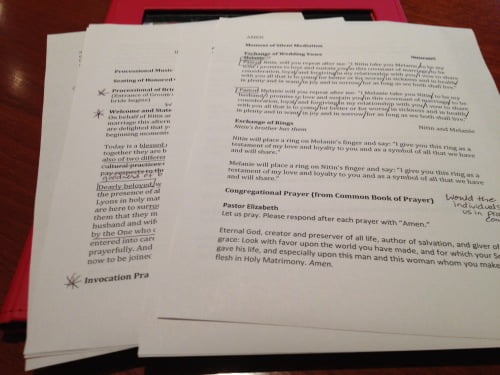
A fragrance of fresh cut rose pedals sweetened the air.
I quickly knew this would be no ordinary afternoon, for me.
Large portions of the script I held in my sermon folder were familiar, though. A well-worn white stole hung around my neck. Pieces of a bulletin from last Sunday (or maybe it was the week before?) filled the pocket of my robe.
In the middle of the museum’s Rotunda on the campus of the University of Pennsylvania, the groom stood beside me in a tan suit with a crème stole around his neck, much like mine.
Within minutes, the bride walked down the aisle in an exotic off-white sari and jewelry stemming from her nose and flowing down her ear lobes.
Soon I said words like this:
Dearly beloved we are gathered here today in the sight of God.
Marriage is a covenant not to be entered into lightly.
Repeat after me: with this ring, I thee wed.
Then, it would be my turn to sit down. Another religious professional took the reigns. In an adjourning courtyard, the gathered audience heard chanting in Sanskrit, offerings of food to God, and prayers for a long and happy future together.
For, this was an interfaith wedding, the bride, a devout convert to Christianity and the groom, Hindu. And at the end, as a sign of unity, the Hindu priest and I both pronounced them man and wife.
Though this was not my first interfaith wedding, it was my first Hindu one. (Just so you know, I’m in the “God is too big to fit into one religion” camp). As the Hindu part began, I observed a ceremony of string, fire and making offerings on the altar as I sat watching from one of those little white folding chairs.
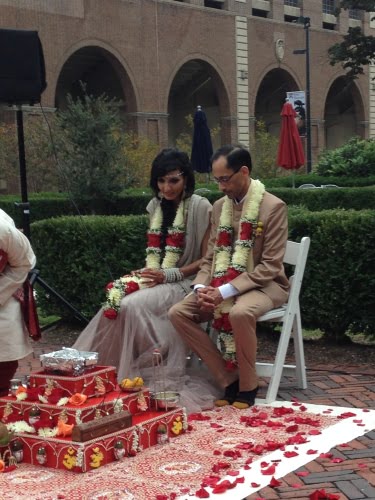 I have to admit the Hindu portion seemed odd at first. But, slowly as the priest translated the ritual into English my spirit resonated its intentions with those I’d just performed.
I have to admit the Hindu portion seemed odd at first. But, slowly as the priest translated the ritual into English my spirit resonated its intentions with those I’d just performed.
Commitment of the couple to each other.
Blessing their vows as a community.
Thanksgiving to God for this moment of joy.
Afterwards, when I was on the way back to my house for the evening, I couldn’t have been prouder. I felt sad the bride's pastor who said “no" to this amazing experience.
In my opinion, there isn’t anything more beautiful than an interfaith wedding.
In our growing cultural obsession with marrying fast and divorcing even faster, one might think that interfaith couples are doomed from the start. But not always.
A 1+1 faith doesn’t have to mean 0. It can actually mean a strengthening of bonds and faiths like my friend, Dana writes about frequently on her blog.
But not only this, I can’t think of a braver thing to do than to marry someone outside your own tradition, even if you come from the same cultural background (as the couple I married did). It’s hard work to find your footing when the partner walking beside you is on a different path. It’s hard work that requires much sacrifice. Interfaith coupling is not for the weak-hearted. And, I admire that!
Interfaith weddings are also beautiful because they have a lot to teach us about God. Though we as Christians may call God—Father, Son and Holy Ghost—there are other lovers of our God who may call God by other names, or sing God other kinds of songs, or even pray to God with different kinds of petitions. Hearing God’s praise in an unfamiliar context gives us the chance to behold God anew.
You need to know about me that I don’t do non-religious ceremonies. I am not a judge or the justice of the peace. I don’t know how to plan a wedding without invoking God’s name or reading scripture. If a couple wants a non-religious ceremony, I help them find the appropriate person.
But interfaith weddings—that’s a whole other lovely thing.
My own experience with God grows as I plan and learn. What could be better than that?
I’ll gladly lead another interfaith wedding soon (I hope!) and pray for this new couple that their bonds grow deep in all the days to come.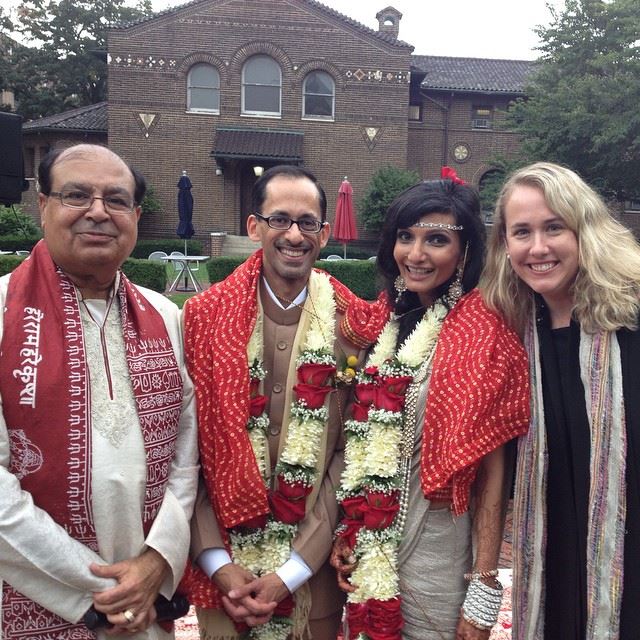
Today marks the final installment of my summer blog series on Pentecost with a fabulous word from my seminary classmate and friend, Dana .Dana has a powerful story to tell and I'm glad to have her words to share with you here. If you've missed any of these posts, might I suggest catching up before you start with this post one explaining the series.
 The Turning Point: How the Spirit Changes Everything
The Turning Point: How the Spirit Changes Everything
I was baptized on Pentecost by an ordained woman serving south of the Mason-Dixon line, a miracle for Baptist churches of the 1990s. At that time, only the most progressive worshiping communities were hiring female ministers to serve in a capacity other than serving as Christian educators.
That Pentecost morning, I was born into the Christian community with water and Spirit. But my baptism sparked a chain of events that would, ultimately, reach beyond the membership of Christ’s Church. It would lead to my early Christian formation, my decision to attend seminary, my ordination—and—an extraordinary turning point—my marrying outside the Christian faith.
Pentecost: A Promise Comes to Life
Pentecost marks a liturgical season in which the Christian Church celebrates exactly how she became Church: through the work of the Holy Spirit, received by the apostles and other followers of Christ in Acts 2.
At the ascension, Jesus told his disciples that “John baptized with water, but you will be baptized with the Holy Spirit” (Acts 1:5, NRSV).
Jesus’ promise manifested days later, when the followers of Christ were gathered for Shavuot the Jewish Feast of Weeks that commemorates the law given at Mount Sinai. Scripture tells us that “tongues of fire” rested on them, offering the power of God through the Holy Spirit.
It was their turning point.
The Fruit of the Spirit
Later, in Paul’s letter to the Galatians, we learn more about what this “turning point” brought to the Christ-followers: the empowerment to share Jesus’ birth, life, ministry, death, and resurrection to all whom they met. We know that the power of this Spirit spread, and it bore the fruit of love, joy, peace, patience, kindness, generosity, faithfulness, gentleness, and self-control (Galatians 5:22-26).
But Paul cautioned the early fledgling church: “if we live by the Spirit, let us also be guided by the Spirit” (Galatians 5:25).
Then and now, this means fostering a posture of love and humility.
But that is not how many people would describe the trajectory of the modern Christian Church.
As Christian minister married to a devout Hindu, I’ve seen first-hand the hatred Christians can spew toward non-Christians. And, that is not the work of the Spirit that was so graciously bestowed upon us in Jesus’ absence.
When we concede that we know all there is to know about God, sacred texts, and how religion should be run, we’ve neglected our Pentecost roots. We’re forgetting the “turning point” in which the Church was birthed. The Spirit was not given to us to spread dogma and draw lines between who’s in and who’s out. The Spirit was given to unite us.
Perhaps the “turning point” we need in 2014 is to re-visit Acts 2 and remember the “awe that came upon everyone” that day. It was a day of unity, not division.
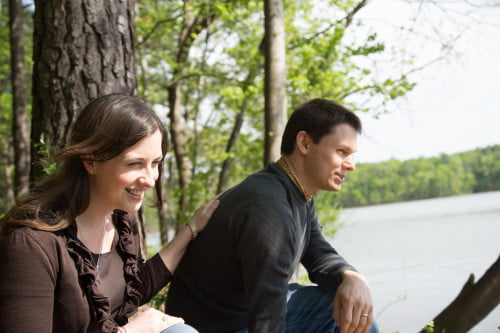 One Spirit: Interfaith Marriage
One Spirit: Interfaith Marriage
Since marrying Fred, I find myself advocating for how the Spirit unites us across religious and non-religious boundaries. I believe in a God who is Creator of us all—not an exclusive God who loves and listens to a chosen few.
But, we often take the initial reaction the onlookers had at Pentecost. We assert that those who are eager to unite are actually “drunk” with ignorance. We have difficulty conceiving that there are mysterious forces that unites us, not divide us.
While my mixed-faith marriage challenges everything I’ve known to be “true,” living with a Hindu helps me see the unifying Spirit at work. Our willingness to learn more about one another’s spiritual journeys is how we reach the pivot: when we look closer, we discover connections we never dreamed possible. And that is our turning point.
J. Dana Trent is an ordained Baptist minister and the author of Saffron Cross: The Unlikely Story of How a Christian Minister Married a Hindu Monk. When she’s not procrastinating with episodes of “The Young and the Restless,” Dana blogs at jdanatrent.com and tweets @jdanatrent.
 We live in a growing interfaith world.
We live in a growing interfaith world.
We simply do not marry or interact or learn from people who come from the same exact faith background as us.
Rarely do any us stay "one thing" our whole life without influence from another tradition. And, because of social media, have so many opportunities to know who God by route of those who might call God a different name than us.
Today I'm sharing the story of how I released the exclusive beliefs of my childhood through relationships with interfaith friends. I know the teachers of my evangelical past might say that I've lost my way, but I've chosen love and shared wisdom over judgment. Here's my surprising conversion:
The first time I heard the phrase “God is too big for any one religion” I was in seminary in North Carolina.This statement was found on a bumper sticker on my roommate’s car. I looked at it every morning when I walked out of the house to go to school. I was intrigued, but confused.
Growing up with a “Jesus is the only way to God” upbringing, I had no idea about what to think of my Baptist soon-to-be clergy friend’s bold declaration on her car.
Was she crazy being so public about her inclusive theology in the Bible Belt? I worried about her safety on the road.
Several years later I found myself pastoring full-time in the Washington DC area—the land of much cultural and ideological diversity. In my free time, I dated Kevin, also a Baptist, who lived in a shared house in the city with two other guys. I liked them a lot. They were funny, smart and accepting of my growing presence in their home. They just so happened to be Hindu and Baha’i.
Read the rest over at my friend, Rev. J. Dana Trent's blog.
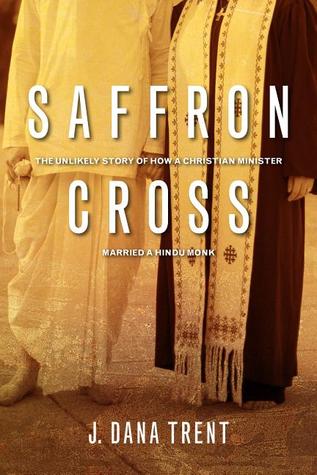 Next week, a dear friend from seminary is hitting an amazing life milestone. J. Dana Trent's first book: Saffron Cross will be released.
Next week, a dear friend from seminary is hitting an amazing life milestone. J. Dana Trent's first book: Saffron Cross will be released.
And I think you should read it. Not just because I know and like Dana as a person, but because I've read it and know you'll love it too.
Saffron Cross is a breath of fresh air to the conversation not only about interfaith marriage but what it means to live in an interfaith society.
With careful attention to not only her experience of Christianity but the Hinduism of her husband, Dana provides a grace-filled memoir of what it looks like to embrace the faith of another not only when it is sexy but also when it is not.
In a culture where it is assumed that 1+1 faith = no faith at all, Dana provides a vivid portrayal of how she and her husband, Fred are forging a new path-- a path rich in mutual learning, compromise, but most of all love for one another's faith experiences.
As you read Saffron Cross not only will you grow alongside the author both in the foundational principles of Christianity and Hinduism-- which Dana Trent does a great job of describing-- but of what deepening a spiritual life looks like in a modern paradigm.
We learn from Dana that just because you are ordained in a tradition, it doesn't mean its faith has yet seeped its way into you.
We learn from Fred that just because you leave a faith tradition for another (as he did with Christianity for Hinduism) it doesn't mean that there is not still much to learn from your roots.
This is a memoir not just for those already involved in interfaith relationships or ministries, but all of us who want to understand how to grow in faith alongside all our neighbors. Because, as Saffron Cross shows us, we are indeed more alike than we are different in our desire for God-- we just have to do the work to see it for ourselves.
In a world where violence occurs over religious affiliation all the time (as happened just last week in Kenya and Pakistan), we need more stories like the ones that the Trent/ Eaker household so willingly shares.
 The first time I heard the phrase "God is too big for any one religion" I was in seminary. This statement was found on a bumper sticker on my roommate's car. I looked at it every morning when I walked out of the house to go to school. I was intrigued, but confused. Growing up with a "Jesus is the only way to God" upbringing, I had no idea about what to think of my Baptist soon-to-be clergy friend's bold declaration on her car. Was she crazy being so public about her inclusive theology in the Bible Belt of the US??
The first time I heard the phrase "God is too big for any one religion" I was in seminary. This statement was found on a bumper sticker on my roommate's car. I looked at it every morning when I walked out of the house to go to school. I was intrigued, but confused. Growing up with a "Jesus is the only way to God" upbringing, I had no idea about what to think of my Baptist soon-to-be clergy friend's bold declaration on her car. Was she crazy being so public about her inclusive theology in the Bible Belt of the US??
Fast forward nine years to the present, as I willing submitted myself to a continuing education course in the practice of spiritual direction in an interfaith setting. My discomfort with God being found outside the bounds of Christianity has greatly diminished through thought, prayer and careful study. I believe that Jesus is the only way to God for me, but might not be the case for someone else. Vocationally, I am a pastor of an opened minded church where all are welcome as they work through their spiritual struggles (And, we really mean all). And, I am so proud to have friends in other faith traditions from whom I regularly meet with and learn from in my neighborhood. I find my own faith journey encouraged not only by texts in the words of Christian scripture, but reading of all kinds that draws my attention back to the common humanity that we all share. I too, can now talk about the vastness of God with confidence too.
So, while there were countless spiritual direction programs I could have learned much from in my own Christian tradition (much closer to home too), something stuck out to me about Chaplaincy Institute in Berkeley. It wouldn't let me go. I knew this would be a place where I would learn in a completely different context of my seminary education or any other formal training I've had, for that matter. I knew I could be uncomfortable, stretched theologically and come to moments of complete disagreement with my classmates. But, I also knew that this would be good for me. What might the Spirit be leading me into next? And for the past three days I've been learning.
In all my processing, I''m still scratching my head with all of the "why" questions of what being in a program like this for the next year (I'll come back 3 other times before graduating) will mean for my future. But, what I do know is this: how blessed it is when brothers and sisters dwell together in unity of our common human tradition. Though I'm tempted to challenge my classmates at many junctures about their ideas on the brokeness (or not) in this world, God's essence, human responsiblity, who the divine is, and the importance of committment to a faith community, such is not why I am here.
I am here to learn about how to receive stories of fellow pilgrims on a spiritual journey. I am here to learn how to be a better listener both to myself and others. I am here to learn from the richness of the world's religious traditions, so to better edify my own spiritual practices. I am here to be among a community of folks unlike any other experience I could receive at home in DC.
While some might think I'm crazy and might even "loose" my own faith in an integrated setting like this, I have to say that such the opposite is true. Being in an interfaith culture for the week, I'm remembering again why I love being a Christian and why I could not imagine any other path for my life. While I can appreciate the faith practices of my classmates, I can't imagine embracing their beliefs for myself.
Sure, there are hair pulling out moments where I wonder how soon I can go back to my Christian cocoon and why the teaching doesn't mean more of "my" needs. But, such is far from the point. There is something I need from my classmates. Our world is growing more by the day in the direction against "organized religion" so it seems the interfaith education is the future. The God I am meeting in Berkeley is pushing my buttons, but this is what living in Interfaith land is all about.
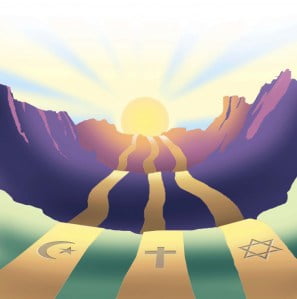 Yesterday, I got this email from the ADAMS Center (All Dulles Area Mulism Society) in Sterling, Virginia of which Washington Plaza Baptist is a friend. As you might remember last January, Kevin and I traveled to Israel in support and friendship of Imam Magid of ADAMS.
Yesterday, I got this email from the ADAMS Center (All Dulles Area Mulism Society) in Sterling, Virginia of which Washington Plaza Baptist is a friend. As you might remember last January, Kevin and I traveled to Israel in support and friendship of Imam Magid of ADAMS.
What troubles me most about this email is that the state of religion in our world in general is that this email needed to be sent at all. We assume that every Muslim is the same, that every Jew is the is same, and that every Christian is the same. And, thus, when one Jew, Christian or Muslim acts up, all people of that religion are to blame. I am proud to have friends in these faiths and others and support all well-meaning religious devotees . And, I want to add my name to the list of those who love and support my Muslim friends.
Washington Plaza Baptist along with Oakbrook Church and Northern Hebrew Congregation will be hosting an Interfaith meeting, talking about the book, The Faith Club, on January 18th at 7 pm. Our friends at ADAMS have agreed to host. It will be a great chance to continue to grow in friendship and peace so that more of these emails don't need to be sent in the future!
In the Name of God, The Compassionate, The Merciful
The All Dulles Area Muslim Society (ADAMS) condemns the terrorist crimes against humanity in the Christmas Day attacks on Christians Churches in Madalla, Jos, Kano, Damaturu and Gadaka in Nigeria. Our hearts, thoughts and profound sympathies are with all the victims of these horrific acts, and with their families. We urge the Nigerian government to take all measures to prosecute all those responsible for these heinous crimes, swiftly and to the fullest measure. We pray for peace between the Muslim and Christian Community in Nigeria, and must work together to help bring about that peace, and an end to terrorism, extremism and conflict.
We are especially troubled by these events since ADAMS had in October hosted an Interfaith event featuring two Nigerian interfaith icons, Imam Muhammad Ashafa and Pastor James Wuye, two former Nigerian militia leaders turned peace-makers who have spent several years trying to bring an end to such warfare and conflicts in their home country (http://www.adamscenter.org/announcements/The__Imam__and__the__Pastor)
"It is a sad day for all people when a simple act of worship or community celebration is marked by violence and innocent deaths", said Imam Magid, ADAMS' Executive Director. "We therefore ask all Muslim community members and organizations in Nigeria to lend support to the families who lost loved ones during these attacks, and we urge American Muslims to join them in praying that God may ease the suffering of all those affected by this terrible tragedy."
As Islam holds the human soul in high esteem, we consider any attack against innocent human beings to be a grave sin. ADAMS has consistently and clearly stated that those who commit acts of terror, murder and cruelty in the name of Islam are not only destroying innocent lives, but are also betraying the values of the faith they claim to represent. No injustice done to Muslims can ever justify the massacre of innocent people, and no act of terror will ever serve the cause of Islam. ADAMS and all its members therefore repudiate and dissociate ourselves from any Muslim group or individual who commits such brutal and un-Islamic acts. We refuse to allow our faith to be held hostage by the criminal actions of a tiny minority acting outside the teachings of both the Quran and the Prophet Muhammad, Peace Be Upon Him.
PEACE,
Rizwan Jaka
Board Member & Interfaith/Government/Media Committee Co-Chair, All Dulles Area Muslim Society(ADAMS)